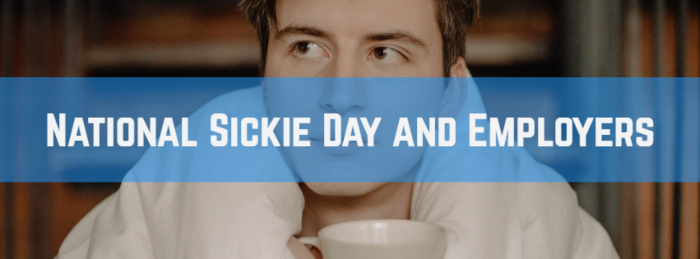National Sickie Day and Employers
|
|
|
|
Author: Paula Beck & Lauren Mawson, HR Business Partners for PACT HR Date: 1st February 2021 January is often seen as a time of rebirth, renewal, new year’s resolutions and a hope of a better year to come. But it also has a darker side. Blue Monday. I’m not referring to New Orders fastest selling hit single, either. Blue Monday is claimed to be the most depressing day of the year and it’s closely followed by National Sickie Day (the first Monday in February) which is known as the day most people will phone in sick. This year it falls on the 1 February 2021. The coining of these days encourages you as employers to address underlying issues such as low staff morale and presenteeism to ensure that they do not spiral out of control and destabilise your workforce. This month we’ll examine the steps you can take to ensure your sickness levels are not excessive, how to deal with feigned sickness and how to create a present, motivated and engaged workforce. It will come as no surprise to any employer that unmotivated employees will occasionally take advantage of National Sickie Day to hide under their duvet and binge watch Netflix. Whilst the legal position is clear, making up or exaggerating an illness is potentially grounds for dismissal, proving this can be difficult – but not in all cases. At PACT HR we have had cases where people have been at concerts, nightclubs, on holidays or sipping a margarita whilst apparently being unfit for work. Unfortunately for them, they also decided to share these moments with the world through social media. In these instances, you can fairly dismiss if you conduct a reasonable investigation and follow your disciplinary procedure. Short term, sporadic sickness and duvet days can be trickier to manage. The first and most fundamental step is to ensure you have a sickness policy in place with defined absence trigger points and the consequences of not meeting these. It’s pivotal that managers are appropriately trained in managing attendance and to ensure that accurate sickness reporting procedures are in place. Presenteeism, where staff are in attendance at work but not fully fit and well, potentially leading them to be less productive, can also be costly as well as difficult to manage. It has also been cited as more common in the public sector, with workers losing over 12% of their time to this. Both absenteeism and presenteeism combined cost the UK economy a huge £70+ billion per year, but it can also have non-monetary effects; if an employee comes to work ill and is contagious they could infect others, and it can also impact on team morale if a colleague is working when unwell and is disengaged and demotivated. Burnout, typically caused by overworking and a poor work/life balance can also contribute to absenteeism and presenteeism as well as a decline in motivation and engagement. Occupational Health should be utilised where appropriate and return to work interviews should be conducted after every period of absence - conducting return to work interviews ensures there is robust monitoring of absence which acts as a deterrent as employees are less likely to do it again. Data should be reviewed for trends or patterns and appropriately challenged. By ensuring a consistency of approach and robust attendance management processes you can minimise the opportunities for employees to take feigned sickness. How PACT HR can help you
For more info on how we can support your teams wellbeing, please contact the PACT HR helpdesk on 01274 436644 or email us at info@pact-hr.co.uk for more details. |
